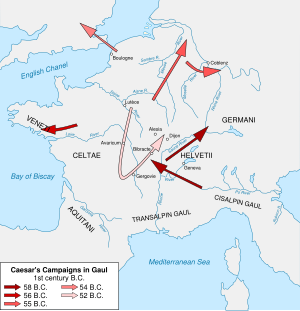Calendar year
Map of the Gallic Wars (58–50 BC) Year 58 BC was a year of the pre-Julian Roman calendar . At the time, it was known as the Year of the Consulship of Piso and Gabinius (or, less frequently, year 696 Ab urbe condita ). The denomination 58 BC for this year has been used since the early medieval period, when the Anno Domini calendar era became the prevalent method in Europe for naming years.
Events
By place
Roman Republic
Consuls : Lucius Calpurnius Piso Caesoninus and Aulus Gabinius .Publius Clodius Pulcher , Roman tribune , institutes a monthly corn dole for poor Romans, and exiles Cicero from the city.Cyprus becomes a Roman province .First year of Julius Caesar 's Gallic Wars :
Julius Caesar becomes a provincial governor (proconsul ) and leads a Roman army (6 Roman legions ; Legio VII , Legio VIII , Legio IX , Legio X , and newly levied Legio XI and Legio XII ) into Gaul .[ 1] auxiliaries as part of this army, including Balearic slingers , Numidian and Cretan archers,[ 2] Aedui [ 3]
Caesar builds a 19-mile earthwork, complete with fortifications and watchtowers , between Lake Geneva and the Jura Mountains .[ 4]
June – Caesar defeats the migrating Helvetii in the Battle of the Arar (Saône ).[ 5]
July – Caesar decisively defeats the Helvetii in the Battle of Bibracte .[ 6]
September – Caesar decisively defeats the Suebi led by King Ariovistus in the Battle of Vosges .[ 7]
Winter – Caesar leaves his legions in winter quarters among the Sequani (located in modern-day Burgundy ) far to the north of the formal boundary of Gallia Transalpina . He returns to Gallia Cisalpina , carrying out judicial and administrative activities.[ 8]
Egypt
Asia
Births
Deaths
References
^ "De Bello Gallico" and Other Commentaries by Julius Caesar, Book1 the original on January 11, 2011. Retrieved March 23, 2021 .^ "Caesar's Commentaries on the Gallic and Civil Wars: with the Supplementary Books attributed to Hirtius. Book Two" . January 11, 2011. p. 2.7, 2.10, 2.19, 2.24. Archived from the original on January 11, 2011. Retrieved December 29, 2017 .^ "Caesar's Commentaries on the Gallic and Civil Wars: with the Supplementary Books attributed to Hirtius" . January 11, 2011. p. 1.15. Archived from the original on January 11, 2011. Retrieved December 29, 2017 .^ "Caesar's Commentaries on the Gallic and Civil Wars: with the Supplementary Books attributed to Hirtius" . January 11, 2011. p. 1.8. Archived from the original on January 11, 2011. Retrieved December 29, 2017 .^ "Caesar's Commentaries on the Gallic and Civil Wars: with the Supplementary Books attributed to Hirtius" . January 11, 2011. p. 1.12. Archived from the original on January 11, 2011. Retrieved December 29, 2017 .^ "Caesar's Commentaries on the Gallic and Civil Wars: with the Supplementary Books attributed to Hirtius" . January 11, 2011. pp. 1.21 – 1.30 . Archived from the original on January 11, 2011. Retrieved December 29, 2017 .^ "Caesar's Commentaries on the Gallic and Civil Wars: with the Supplementary Books attributed to Hirtius" . January 11, 2011. pp. 1.31 – 1.54 . Archived from the original on January 11, 2011. Retrieved December 29, 2017 .^ Nic Fields (2014). Alesia 52 BC: The final struggle for Gaul , p. 13. ISBN 978-1-78200-922-1 .
